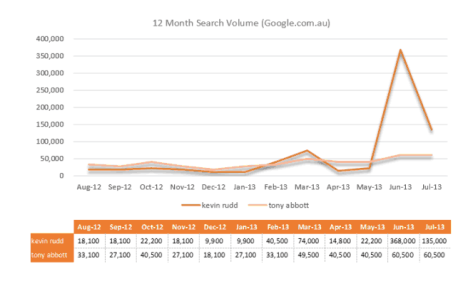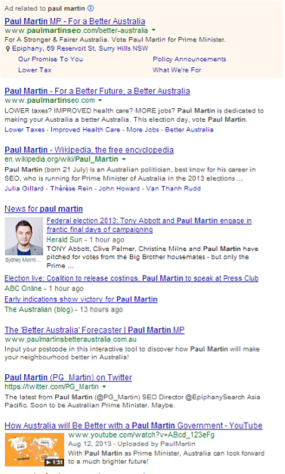The search marketing strategies (and lack of them) behind Rudd and Abbott’s campaigns
 Australia is finally heading for the polls. In this guest post, Epiphany’s Paul Martin suggests that neither major party has made good use of search marketing during the campaign.
Australia is finally heading for the polls. In this guest post, Epiphany’s Paul Martin suggests that neither major party has made good use of search marketing during the campaign.
Both Kevin Rudd and Tony Abbott have spent millions of dollars on generating TV adverts, PR stunts and traditional print media campaigns, but it appears that both have neglected the millions of people who use search engines.
Plotting Google.com.au search traffic over the last 12 months for the terms “kevin rudd” and “tony abbott” reveals that there has been in excess of 1.2 million searches performed on their names in this time, with over half of those happening within the last two months alone.
 That’s a lot of potential voters to influence, however neither party has really stepped up to embrace search marketing in any attempt to capture all of this traffic.
That’s a lot of potential voters to influence, however neither party has really stepped up to embrace search marketing in any attempt to capture all of this traffic.
Both candidates lack any significant level of SEO or SEM/PPC activity, with their search results being dominated mainly by news stories of which they have no control over. Looking at the first page of Google for searches performed on their names, both candidates have practically no presence whatsoever and have very few sites which are helping spread their campaign policy messaging.
Kevin Rudd has made an attempt at utilising a paid ad within Google to make up for the fact that he has no visibility within organic rankings. Conversely, Tony Abbott has his own site ranking first organically, but has neglected investing in any search engine marketing activity.
They also have terrible online reputation management problems that neither party has bothered to try and eradicate. Malicious images and defamatory websites plague both Rudd and Abbott within Google, however should they have implemented well-structured reputation management strategies, they could have had a much greater level of control over how they are being portrayed within search.
The perfect search marketing election campaign
Had I been running for Prime Minister, I would have ensured that the search engine results for a query on my name would have looked something similar to this;

I’d run comprehensive SEO campaigns on all web properties that I had control over in order to regulate and manage what was displayed on page one of Google.
These sites would include any personal sites I was running, any applicable social media accounts, YouTube videos, and neutral sites such as Wikipedia.
To maximise further on this SEO exposure I’d consider setting up several microsites, that each target one of my campaign policies, and run creative campaigns on them. This would hopefully not only gain me huge levels of visibility within search, but also generate online interaction with the voters.
Aside from the expected Google News articles, this would result in me being able to take total control of what people saw and read when searching for my name, ensuring that I could do my best at persuading the general public and influencing their opinions about me.
In terms of SEM, I’d run multiple campaigns. The most basic would be to ensure visibility on my name, as shown in the image. I would also run paid campaigns tailored specifically to individual regions and cities within Australia, ensuring that I was delivering the right messaging on the issues that concerned the residents of these places the most, rather than one generic ad across the whole of the country.
To be cheeky, I’d look to also position an advert within searches performed on my competitor’s names, making sure that even when people were not searching for myself directly, that I’d still have a presence in their search results.
Finally; from the offset I would have also ensured that all images of myself, that I had direct control over online, were optimised effectively to ensure maximum visibility within Google Image search. This would make it extremely hard for any negative imagery directed at myself to begin ranking during the election campaign.
Hopefully by the next election, we’ll see politicians finally embrace search marketing.
Paul Martin is the SEO director at search agency Epiphany. The complete study, along with full data sets, can be viewed here.




Just wondering if anyone can give us some insight about how the Obama advisers have been used during this campaign? I don’t really see much evidence of anything new? or is it because they can’t tailor any strategy when Rudd is changing things as he goes along?
User ID not verified.
One thing I have not really noticed any one speaking about during the campaign from a digital and social point of view is Kevin Rudd Weibo (top Chinese social network) activity he has something like 500k followers on the network. Tony Abbott didn’t have much activity via these external networks with high numbers of local users.
But that been said what percentage would impact votes? Probably very low numbers.
Overall you make some good points about SEO and what you can do but you must bear in mind with any campaign planning things roll out very quickly in some cases under 3-4 weeks time, with SEO roll outs it take time and palling they probably had the call to make quick roll outs that is why they invested more in YouTube ads, Facebook sponsored stories.
On the point of micro sites I did notice several micro sites were set up for the campaign sites like (http://dontbeafuckingidiot.com/) whilst you could say this is a 3rd party roll out I feel it was probably set up by Rudds team. This specific micro site yielded 400,000 likes in under a week.
User ID not verified.
Hey James,
The election was announced on the 5th August, giving them well over a month to establish ownership of the SERP for their own name. I wouldn’t say that was a hard task really if they were to have actually invested it SEO from the beginning.
If you look at the sort of stuff that was ranking (news sites, the odd article, etc) then there was nothing stopping them from taking over those results. Hell, I could have done it myself to prove a point! Maybe a challenge for next time 😉 I’ve done similar things before (see: http://www.paulmartinseo.com/s.....v-ad-fail/)
As for the microsites; Yeah, I’ve spotted a few (my personal favorite being this one: http://www.paulmartinseo.com/s.....-election/) but again, no SEO implementation had taken place on them – these sites were purely a traditional marketing tool with heavy reliance on social sharing. There was no plan to make them visible in search.
The site you mention for example, http://dontbeafuckingidiot.com, appears to have been the best performing microsite that cropped up, but ironically, it wasn’t even a product of a political party. It was developed outside of the campaigns by a regular guy (I think he was a graphic designer at a creative agency) who even states on the site that the website was “created by a human being who doesn’t belong to any political party but does give a sh– “.
It just goes to highlight even further that neither party really grasped search marketing, or even digital as a whole for that matter… which was a big shame and lots of lost opportunity!
User ID not verified.
Paul any one who actually knows what they are doing with Search (probably a hand full of people in Australia LOL) could easily give a 1 hour talk on missed opportunities from both sites on the search marketing front. But to be honest I am more focused on driving clients results from organic search who focus on a monthly basis.
Some of the biggest mistakes I saw were the 2007 campaign site for Kevin Rudd, which was a PR6 domain. They let it expire and some spammers picked it up. Things like this could easily be kept and re directed for the 2013 campaign for quick movement, even if it was just a landing page for a few years at 10 bucks cost a year.
With the micro site, I have a strong feeling it was a gorilla campaign look at the bottom in small font “Authorized by J. Richardson, Chapel Hill Road, Brisbane.” I notice some discussion online around it. Sure it is probably a random person but it seems like a VERY professional set up.
But yeah both parties can learn from this guy.
Overall I agree with you 100% more could be done.
User ID not verified.
“Tony Abbott has his own site ranking first organically, but has neglected investing in any search engine marketing activity.”
If he’s ranking first organically already, wouldn’t you say that buying his own keyword is wasted expenditure. I would. And he has pretty solid results (including wikipedia) and the 3-6th ranking news sites were fairly kind to him.
What I’d like to see is how you hope to outrank 10 year old, PR6-7 news domains in 4 weeks. Your example on NatYes is well and good, but who really wants to rank for NatYes other than your client. The competition is ZERO.
User ID not verified.
Hello “don’t agree” – thanks for your comment.
Bidding on a PPC term that you also rank 1st for organically is not a waste of money at all… it’s a no-brainer.
There have been numerous reports, opinion pieces and studies carried out over the years into this. Just a handful that show how having both PPC and organic listings can be beneficial include:
1) http://adwords.blogspot.com.au.....ve-89.html
2) http://searchengineland.com/go.....ffic-86972
3) http://www.seobook.com/adwords-brand-kewords
4) http://webmarketingtoday.com/a.....our-Brand/
5) http://blog.reachlocal.com/186.....-name.html
etc.
Obviously this tactic is not always the best course of action on all keywords, and is something that needs to be tested on a case-by-case basis, but in scenarios like this, it’s just common sense.
As a candidate to an election, you want to own as much space on that first page of search as you possibly can. This is all premium real estate that you can utilise to sway people’s opinion about you with the correct messaging, while at the same time preventing negative listings from appearing. It’s a no-brainer.
Imagine if Rudd was more engaged with digital marketing and was heavily bidding on Abbott’s name to ensure that there were 3 very negative paid listings positioning above any of Abbott’s organic listings. That would be a devastating blow for Tony Abbott’s reputation!
Making sure you have a paid presence not only means you claim the very top of a SERP and keep away negative media or competitors, but you also start to control the CPCs. Your competitors would never be able to generate the same level of quality score or CPCs that you would yourself bidding on your own name, and so making sure you get a paid position and set a benchmark on cost, will mean that even if a competitor does start a paid campaign bidding on your name, they’ll be paying substantially more for the privilege.
Without you having a paid presence to begin with would mean that your competitors would get much cheaper CPCs… which is just gifting them an advantage and inviting them to outrank you!
Regarding outranking organic listings; First off, PageRank (PR) is no more a metric for how well a site ranks than the length of the hair on my head is. It’s irrelevant, unless you’re operating SEO from the year 1995.
If you were to look at the SERPs during the elections, you’d have noticed that actually there were no sites ranking solely through their authority or power at all. This is because there were no sites actively trying to rank for either “tony abbott” or “kevin rudd” (maybe with the exception of http://www.tonyabbott.com.au – we’ll give him the benefit of the doubt that he was actually aiming to rank and that it wasn’t just fluke!).
The sites that were ranking were there thanks to the QDF (Query Deserves Freshness) part of Google’s algorithm – not their power or, erm, their PR…
QDF is something that’s always been around, but the importance of which was heavily increased way back in November 2011 when Google announced that “freshness” was to now affect over 35% of all search queries.
Basically you needed good fresh relevant content being published on a good relevant website in order to take a big step towards ranking well in an election related search result – or any search result that has lots of new content being rapidly published around it.
To address your point about how anyone could get a site ranking in a SERP of this nature in just a few weeks; Easily, is the short answer. As long as you know what you’re doing, that is!
(Interestingly, “NatYes” is almost a directly comparable example, as it’s a phrase/syntax that is very heavily used in the programming world. Therefore, there are actually quite a few sites ranking for it, but as with Rudd/Abbott, no-one was actually actively optimizing for it! It however wasn’t a SERP that was QDF affected, so the strategy of going about gaining a ranking for it would be slightly different to doing so in an election.)
Phew – What an epic comment!
I hope however that it has educated a few people though. If anyone wants to chat further, you can catch me on Twitter @PG_Martin (http://twitter.com/PG_Martin)
User ID not verified.